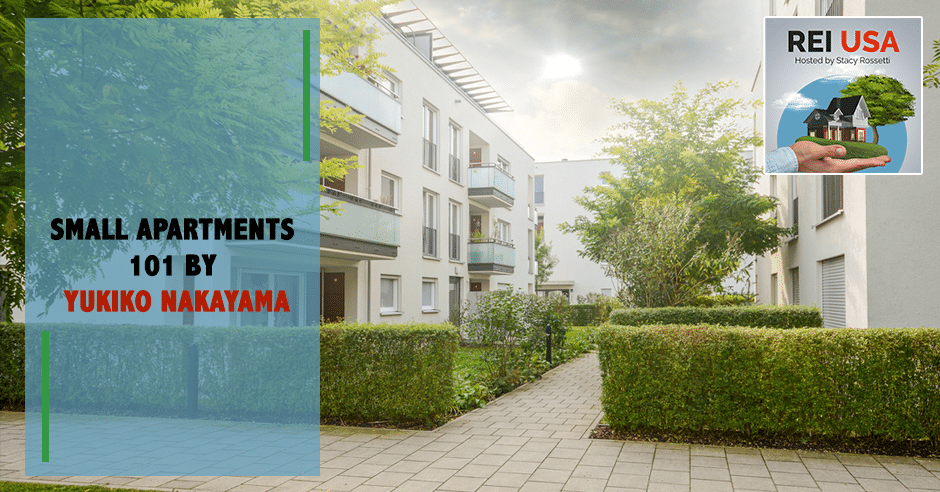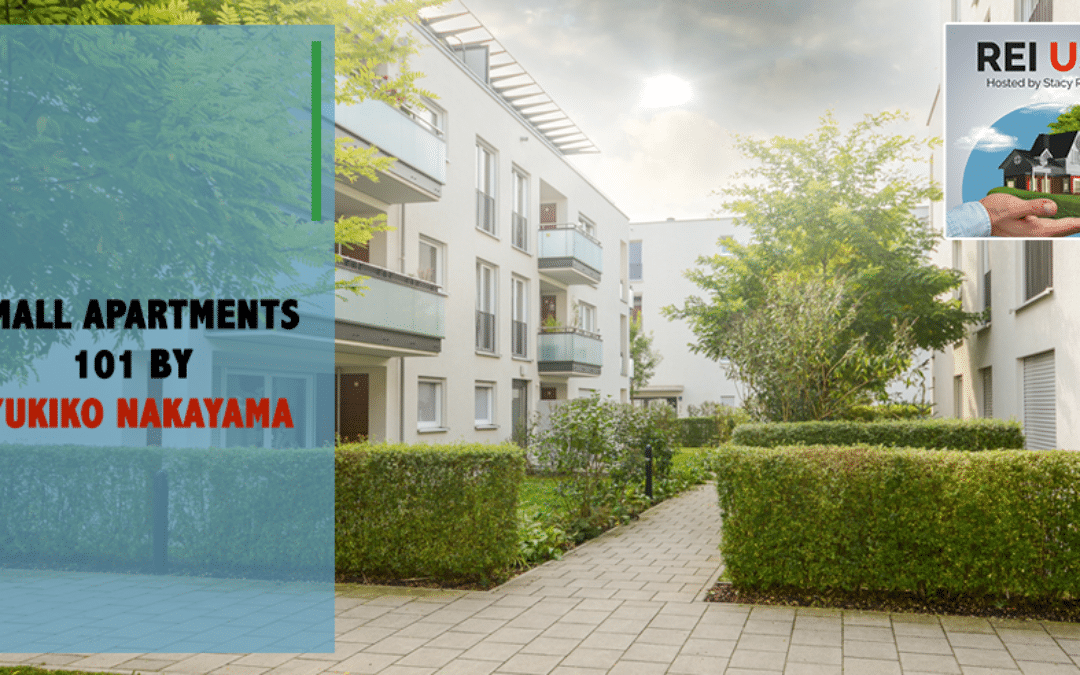
How do you find your niche in real estate? In this episode, Yukiko Nakayama gives you the tools and tips you need to get started. With a niche in small apartments, Yukiko shares how she and her husband found out this was the asset class for them. Plus, she offers great insight to help you identify the right markets to invest in. Tune in for expert real estate advice.
—
Watch the episode here
Listen to the podcast here
Small Apartments 101 By Yukiko Nakayama
My name is Yukiko Nakayama. I would like to thank Stacy for allowing me to share what I learned in the last couple of years of my real estate experience. In this episode, I would like to share two topics on how to pick your niche and how to identify the market. I will touch on my background. I’m originally from Japan. I came here to study and get my MBA. After my MBA, I started working for big six consulting companies working on IT projects. After working in the IT industry in Silicon Valley, I felt like it was time to change a course, start my own business, and then switched to real estate after moving to Northern Virginia.
I’m the President of the Puma Investment. Puma Investment has done small-scale development projects in DC. The project covers single-family development, condo convergence, value add small apartments, and financing with commercial loans and private investors. We are looking to invest in a commercial project like self-storage that Stacy does. Our goal is to create wealth for our path to realistic investment.
In my spare time, I do scuba diving, hiking, and karaoke. I’m very competitive, so I will try to beat my husband to score higher in a karaoke show but never succeeded. I’m a Teacher at REI USA. I teach on the second Tuesday of January 2022 at 7:00 PM Eastern Standard times. The topic is small apartment buildings. I own a small apartment building in Washington, DC. I realized that owning and managing a small apartment building is much different from owning a single-family home or investing in 100 plus unit apartment buildings. Not many people are talking about it, so please join our class if you are interested in a small apartment building.
The first topic is how to pick your niche. Many people pick a niche based on how much they can make or because everyone is talking about a niche without considering their personality or tendency. After working in a different area of real estate including being a landlord, flipping, rehabbing, and investing possibly, I realized I tend to towards one area instead of others in the real estate space. Finally, I figured out that I put it into one particular space because of my personality.
[bctt tweet=”You cannot be all over the map and go with gut feeling. You have to assess the risk associated with the project and go over sales comp.”]
The first step is self-awareness. You think you know yourself but sometimes, you don’t. To find out your personality profile, I recommend taking a test. There are several tests available to you. For example, cognitive testing. You can measure your instinctive ways of doing things by knowing you can maximize your potential. Also, DISC profile. This is an acronym that stands for the four main personality profiles described in the DISC model. D is Dominance, I is Influence, S is Steadiness and C is Conscientiousness.
I’m not sure many people know these profiles or if they ever tried the DISC profile. It’s pretty common for an HR person or some other company to use this to see the employees’ profiles. For example, a person with a D personality tends to be confident and places emphasis on accomplishing the bottom-line result. It’s very direct and dominant. They get down very quickly. People with I personalities tend to be more open and place an emphasis on relationships.
By influencing or persuading others, you can see people talking and can’t stop talking. These are the people with I personalities. People with S personalities tend to be dependable and place the emphasis on cooperation and sincerity. They don’t like confrontations. They keep low profiles and then walk toward the goal steadily. People with a C personality tend to emphasize quality, accuracy, expertise, and competency. They have a very high standard and cannot stand if they come across other people slacking. Everyone has some mixture of personalities but they are usually prominent in one aspect.
I’m probably close to the people with C personalities. I tend to be very accurate, precise, and detail-oriented. If you are interested, you can take a DISC profile at some website. You can also ask your friends and families. They probably know you very well. I took the DISC profile at the Tony Robbins’ site and then my profile is Formalist. The Formalist relies upon procedures and structure in all aspects of life.
They are detail-oriented and seek perfection. They need to know the expectations and timetable for their work. They can get bogged down in details and will not rush important decisions. They will take a risk if they have the facts to support it. They may be initially suspicious of personal compliments, praise or flattery. That’s me based on the DISC profile.
Based on the DISC test, I can be bogged down in the details so sometimes, I keep researching, getting more information, and then cannot decide to purchase or invest. Maybe some people tend to fall in this personality profile. That’s what happened in my first rehab experience. I was in this analysis paralysis mode going to every single comp in the area and then finally, my mentor kicked my butt to push to commit to purchasing the properties. Without his push, I’m not sure I would have done my first rehab.

Small Apartments: The first step is self-awareness.
My first rehab turned out to be very successful, and then I also tend to get upset if I don’t get constant feedback. I also have very high standards for quality, so I have to adjust those expectations to work with my contractors and with rehabbing rental but my detail-oriented personalities work very well with our rehab business. We have to work with certain orders. There are many factors impacting our ability to permit and walk on a project in DC. You cannot be all over the map and go with gut feeling. You have to assess the risk associated with the project and go over sales comp specifically for a high-stake project.
Next, what’s your goal? My initial goal was to make $200 per month for rental. My time was limited. I was raising small kids. I only had a small window each day to work on my real estate business. My husband and I had decent credit but not much cash. My English is limited. You may have a different goal but much of your personality is beneficial in that long-lasting career in real estate.
Next, please look at the options in the real estate space. If you don’t have money and knowledge, you can start becoming a bird dog. Bird dog is finding the motivated seller or an investor. After you become knowledgeable, you can become a wholesaler who can put deals under the contract and assign it to the investor who buys the deal from you and makes more money that way or if you have some money and knowledge, you may want to start rehabbing and renting.
If you are a supplier to do the commercial, you can work as an operator and syndicator who find the deals, syndicate the deals, manage and operate the deal, which can be tons of work or you can become a syndicator, and then work on the capital side of the business. If you have tons of money, you can maybe start family offers to invest purely on significant projects that are looking for returns.
Anyone can start at any point if you get enough knowledge, relationship, and access to the capital. However, keep your personality and tendency in mind. You may find the most satisfaction working in a real estate space that you choose instead of not being happy. Here’s what I did in 2010. I started working on getting my rental.
I worked on the direct marketing campaign. We said, “We buy houses quick closing.” The campaign hit the seller at good timing. He planned to buy a bigger building and needed cash for a down payment. I hired someone much communicative and persuasive at a $100 rate. I’m not persuasive. He successfully negotiated the deals and I purchased the property. It has ended up becoming a steady rental for a long time. I sold the property in 2010 doubling my money.
Here’s another case when you want to execute your plans. For example, maybe you are an agent or business owner who needs to make sales. You need to work on social media making risks to an appointment and combining appointments to sellers and buyers. Suppose you are not good with the consistent marketing effort. You may need to partner up with someone or hire out like I did when I was negotiating a deal with a seller to buy a rental or you can pick up a book to change your habits.
[bctt tweet=”Anyone can start in real estate at any point, if you gain knowledge, relationships, and access to capital.”]
I highly recommend a book called Atomic Habits. You can start changing small habits like going to bed early. That can make a profound effect and spread into other aspects of your life. Lastly, when you start making progress, it’s time to keep track of progress. You need to measure what matters to you. If you are an agent, you need to keep track of the number of leads and how you are converting.
If you are a landlord, and then you are doing rental, you have to keep track of which property is making money and how long the turnover is taking. You can pick your KPI by yourself, and then keep track of your progress. There is a book called Measure What Matters by John Doerr and we will form and build a business around the concept. I highly recommend you read the book. You can also do a weekly review to see where it went well and not well. You can change the course of the actions based on the weekly review.
Also, you can join a mastermind or find an accountability partner to keep each other accountable for your progress. I also had an accountability partner. I check in with him every week to check on our progress. For the next topic, I would like to talk about how to pick your market. First, it’s best to try your backyard because it’s closer. If you are doing a small rental, you can check your backyard very often. It’s best to know the market very well already so you can start from there. Please check the demographic data like the job growth, the rent growth in the past, and the income growth.
You can check the demographic data from the census data from the government, and then you can check also the job growth on the government website. The rent growth can be tricky. For commercial, there’s a company called CoStar, which is expensive but you can easily find some data available in ApartmentGuide.com or LENDERmonitor.com. You can check how the rent growth is in that area.
Also, you can check household income growth with some government information. If you are in an area where job growth is strong and rent increases, you can successfully cater to the market by digging data, which a majority of people are buying, what type, and which price point. If you already hover, you should pay attention to what’s the median income people can afford.

Small Apartments: When you start making progress, it’s time to keep track with that progress. You need to measure what matters to you.
If they can’t afford townhouses, and then they are buying in a specific area, that’s the area you should focus on flipping the houses. For rentals, you want to see a rent increase. For example, DC is very strong with job growth. If you have rent control, you may not be able to increase that rent at a higher rate. You pay attention to which area is good for and which type of investment. For rental, there are different types of investment required, data digging, and then market research.
Please drive around the market, and then subscribe to the local newspaper. Even when you are doing a small apartment building or single-family home, please pay attention to commercial development. People move into a specific area because there are amenities. A new gym and restaurant are coming in, so amenities are very important for the market you are looking at. This has become a commercial real estate event. They also have a newsletter. If you subscribe, you can get a lot of information about what’s coming and when is the development coming in your local area.
If you are in the area with no growth or declined population in a job, there’s still probably an opportunity at the micro-level. Everything is macro level but if you look in a micro-level or your local level, there probably are opportunities but then you may consider out-of-state and remote investments. If you decide to invest remotely, it might be better to scale to a commercial project like self-storage that Stacy does.
If that’s the case, where’s an excellent market to invest in self-storage? You look at the demand and supply and then pique the market. There is some balance, and then take advantage of the market. This is the section on how to find a good market. I teach at 7:00 PM Eastern on the second Tuesday of January 2022 and the next one is February 8th, 2022, at 7:00 PM Eastern.
That’s the time when I teach small apartment building, how to buy, manage and sometimes, give you a value add strategy for the small apartment building. This is my contact information. If you would like to get several things to keep in mind to buy a small apartment building, I have a checklist. If you send me an email with Badass in the subject line, I can send those checklists to you.
Important Links
- Puma Investment
- Tony Robbins
- Atomic Habits
- Measure What Matters
- CoStar
- ApartmentGuide.com
- LENDERmonitor.com
- https://www.REI-USA.com/yukiko-nakayama/
- REI USA
- http://www.rei-usa.com/membership/
- http://www.REI-USA.com/trainings/
- http://www.REI-USA.com/ teachers-spotlight/
- http://www.rei-usa.com/free-template/
- https://www.instagram.com/reiusa_/
- Free Online Jumpstart Course for Real Estate Investing: https://bit.ly/3IrDji9
- REI USA Youtube: https://bit.ly/36QPoQl
- How to Get Started Investing in Real Estate: https://bit.ly/3pIxB4r
- Talk to Kristi, Our Community Manager, for a FREE 10 Minute Website Demo: https://bit.ly/3pIxB4r
About Yukiko Nakayama
 Yukiko lives in New York and invests in New York. Ms. Yukiko Nakayama is a real estate developer focusing on residential redevelopment for 14 years. She manages acquisitions, financial analysis, project management, marketing,and financing. Prior to her real estate careers, she worked as a marketing consultant to multinational companies including Samsung and Fujitsu. She also worked at KPMG consulting working on various IT projects both domestic and Internationally. In her spare time, she enjoys scuba diving, water rafting, and swimming. She is originally from Japan and lives with her husband and her daughter.
Yukiko lives in New York and invests in New York. Ms. Yukiko Nakayama is a real estate developer focusing on residential redevelopment for 14 years. She manages acquisitions, financial analysis, project management, marketing,and financing. Prior to her real estate careers, she worked as a marketing consultant to multinational companies including Samsung and Fujitsu. She also worked at KPMG consulting working on various IT projects both domestic and Internationally. In her spare time, she enjoys scuba diving, water rafting, and swimming. She is originally from Japan and lives with her husband and her daughter.

